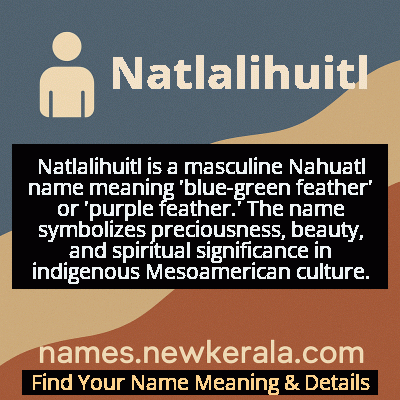Natlalihuitl Name Meaning & Details
Origin, Popularity, Numerology Analysis & Name Meaning of Natlalihuitl
Discover the origin, meaning, and cultural significance of the name NATLALIHUITL. Delve into its historical roots and explore the lasting impact it has had on communities and traditions.
Name
Natlalihuitl
Gender
Male
Origin
Nahuatl
Lucky Number
4
Meaning of the Name - Natlalihuitl
Natlalihuitl is a masculine Nahuatl name meaning 'blue-green feather' or 'purple feather.' The name symbolizes preciousness, beauty, and spiritual significance in indigenous Mesoamerican culture.
Natlalihuitl - Complete Numerology Analysis
Your Numerology Number
Based on Pythagorean Numerology System
Ruling Planet
Uranus (Rahu)
Positive Nature
Strong sense of order, loyal, practical, and disciplined.
Negative Traits
Stubborn, overly serious, rigid, and prone to feeling restricted.
Lucky Colours
Blue, gray.
Lucky Days
Saturday.
Lucky Stones
Blue sapphire.
Harmony Numbers
1, 7, 8.
Best Suited Professions
Managers, engineers, accountants, organizers.
What People Like About You
Dependability, discipline, practicality.
Famous People Named Natlalihuitl
Natlalihuitl Teuctli
Noble Ruler
Ruled a prominent altepetl (city-state) in the Valley of Mexico, known for diplomatic alliances and featherwork patronage
Natlalihuitl Xochitl
Master Artisan
Renowned creator of ceremonial feather mosaics for Aztec nobility and religious ceremonies
Natlalihuitl Mazatl
Military Commander
Led successful military campaigns while maintaining the philosophical warrior ideal of feather symbolism
Natlalihuitl Cuauhtli
Spiritual Leader
Preserved ancient feather ceremonial traditions and their spiritual significance
Name Variations & International Equivalents
Click on blue names to explore their detailed meanings. Gray names with will be available soon.
Cultural & Historical Significance
The cultural importance extends to the economic and artistic realms, as featherworking (amantecayotl) was a highly respected profession requiring years of training. Feathers were collected through extensive trade networks and tribute systems, making them symbols of imperial power and cultural sophistication. The name Natlalihuitl thus represents not just physical beauty but the entire cultural complex of feather artistry, spiritual symbolism, and social hierarchy in ancient Mesoamerican civilizations. It connects the bearer to a tradition where natural elements were transformed into cultural treasures through skilled craftsmanship and religious devotion.
Extended Personality Analysis
Individuals named Natlalihuitl are often perceived as possessing a rare combination of aesthetic sensitivity and spiritual depth. They tend to be creative, artistic souls with an innate appreciation for beauty in all its forms, much like the precious feathers their name represents. These individuals often demonstrate exceptional attention to detail and craftsmanship in their pursuits, whether in artistic endeavors, professional work, or personal relationships. Their presence tends to elevate situations and inspire others, reflecting the feather's symbolic role in ceremonial contexts where it enhanced spiritual experiences.
Socially, Natlalihuitl bearers typically exhibit diplomatic skills and cultural sophistication, able to navigate complex social situations with grace and wisdom. They often serve as bridges between different groups or perspectives, much like feathers connected earthly and divine realms in traditional belief. There's a natural nobility in their demeanor, not in an arrogant sense, but in their commitment to principles of beauty, harmony, and cultural preservation. They may show particular interest in traditional arts, environmental conservation, or cultural heritage, driven by their name's connection to precious natural resources and artistic transformation.
Modern Usage & Popularity
In contemporary times, Natlalihuitl remains a rare but meaningful choice primarily within Nahua communities and among families seeking to preserve indigenous cultural heritage. The name has seen a modest resurgence as part of broader indigenous identity movements and cultural revitalization efforts throughout Mexico and Mexican-American communities. While not appearing on mainstream popularity charts, it holds significant cultural weight and is often chosen by parents with strong connections to Nahuatl traditions or those working in artistic and cultural preservation fields. Modern bearers of the name frequently become advocates for indigenous rights, environmental conservation, or traditional arts, living out the name's symbolic connections to precious natural resources and cultural craftsmanship.
Symbolic & Spiritual Meanings
Symbolically, Natlalihuitl represents the transformation of natural beauty into cultural significance, embodying the journey from raw material to refined artistry. The blue-green and purple feathers symbolize rarity, value, and spiritual elevation, suggesting that the bearer carries something precious and divine within. Metaphorically, the name speaks to the idea of 'lightness' and 'elevation' - not just physical lightness like a feather, but spiritual and intellectual transcendence. It represents the ability to bridge different realms or perspectives, much like feathers connected earthly and spiritual worlds in traditional belief. The name also carries environmental symbolism, reminding us of humanity's relationship with nature and the responsibility to preserve and honor precious natural resources.

